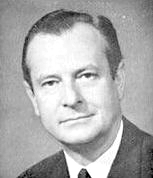Jean Lecanuet
Jean Adrien François Lecanuet (born March 4, 1920 in Rouen , † February 21, 1993 in Neuilly-sur-Seine ) was a French politician . He was chairman of the Christian Democratic parties MRP , CD , CDS and UDF ; French Senator (1959–1973 and 1977–1993), Minister of Justice (1974–1976) and Minister of Planning (1976–1977). He was also Mayor of Rouen from 1968 until his death and a member of the European Parliament from 1979 to 1988 .
Life
Lecanuet came from humble backgrounds. In 1942 Lecanuet was the youngest lecturer in France ( philosophy ). At the same time, he was involved in Capitaine Michel's Resistance group , specializing in railroad sabotage.
After France's liberation, the young philosophy professor opted for politics ( MRP ) and worked for several ministers of this party from 1945 to 1951 (some as head of cabinet). From 1951 to 1955 he was a member of his home department of Seine-Maritime in the National Assembly . As such, he took on various functions, including in the Conseil d'État . From October 1955 to 1956 he was State Secretary for Relations with the "Associated States" (former French colonies in Indochina ). After the establishment of the Fifth Republic he was from 1959 to 1973 as a centrist for the constituency of Seine-Maritime in the French Senate . In May 1963 he took over the chairmanship of the MRP, but the party had lost much of its importance and was in the process of dissolution. Many voters and MPs had defected to the Gaullists .
As a centrist candidate, Lecanuet, supported by Paul Reynaud , ran in 1965 in the presidential elections against incumbent President General Charles de Gaulle . In the first ballot on December 5, 1965, he received 15.6% (3.78 million votes) and was eliminated as third with a clear gap to de Gaulle with 44.6% and François Mitterrand with 31.7%, but thus forced surprisingly de Gaulle in a second ballot against Mitterrand. After the election, he founded the Center démocrate (CD) as a new party of the middle class, in which the Christian Democratic MRP and the liberal-conservative CNIP as well as individuals like René Pleven joined forces. However, the CNIP members left the CD after a year, so that it essentially remained a successor party to the MRP.
He was mayor of his hometown of Rouen for 25 years from 1968 until his death . There he introduced the first pedestrian zone in France.

In the run-up to the 1973 parliamentary elections, Lecanuet's CD with the Parti radical valoisien by Jean-Jacques Servan-Schreiber and smaller center parties formed an alliance, the Mouvement Réformateur , which positioned itself between the government camp of President Georges Pompidou and the left union of socialists and communists. Before the second ballot, Lecanuet negotiated the tactical withdrawal of centrist and Gaullist candidates in key constituencies with Prime Minister Pierre Messmer , which together helped the two groups gain a majority in the National Assembly. Lecanuet resigned from his Senate seat and successfully ran for a seat in the National Assembly.
In the 1974 presidential election , he supported the candidacy of the ultimately victorious Valéry Giscard d'Estaing . Under his presidency, Lecanuet was Minister of Justice in the Chirac I cabinet from May 1974 to August 1976 . During this time, he campaigned for the voting age to be reduced to 18 years. He defended the constitutional reform that allows sixty MPs to call on the Constitutional Council. In May 1976 Lecanuets Center démocrate merged with another Christian Democratic party, the Center démocratie et progrès by Jacques Duhamel , to form the Center des démocrates sociaux (CDS). Whose chairman was Lecanuet then to 1982. The government Raymond Barres he was from August 1976 to March 1977 as Ministre d'État (d. E. One of the most senior minister) in charge of Planning and Regional Development (ministre du Plan et de l'Aménagement du territoire) to .
From 1977 to 1988 he was again for the constituency of Seine-Maritime in the Senate, where from 1979 he headed the Committee on Foreign Affairs, Defense and the Armed Forces. The bourgeois center-right parties that supported Giscard d'Estaing's presidency formed a long-term alliance in 1978, the Union pour la démocratie française (UDF), chaired by Lecanuet for the next ten years. An Atlanticist, staunch European and supporter of the United States of Europe , he was also elected Member of the European Parliament in 1979. There he sat in the Christian Democratic Group of the European People's Party (EPP). From 1987 to 1988 he was a board member of the EPP Group and chairman of the European Parliament delegation for relations with the Gulf States. In the referendum on the Maastricht EU Treaty, he vigorously campaigned for a “yes”.
Honors
- 1958: Commander with the star of the Papal Order of Knights of St. Gregory the Great
Web links
- Entry on Jean Lecanuet in the European Parliament 's database of MEPs
Individual evidence
| personal data | |
|---|---|
| SURNAME | Lecanuet, Jean |
| ALTERNATIVE NAMES | Lecanuet, Jean Adrien François (full name) |
| BRIEF DESCRIPTION | French politician (MRP, CDS, UDF), member of the National Assembly, MEP |
| DATE OF BIRTH | March 4, 1920 |
| PLACE OF BIRTH | Rouen |
| DATE OF DEATH | February 21, 1993 |
| Place of death | Neuilly-sur-Seine |

